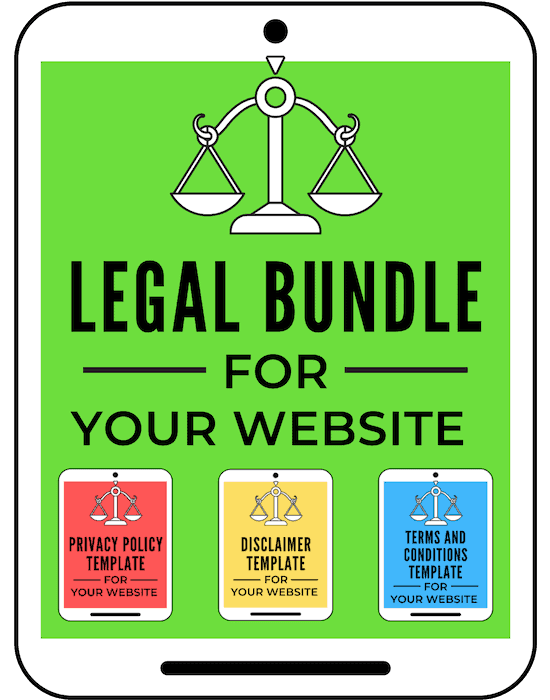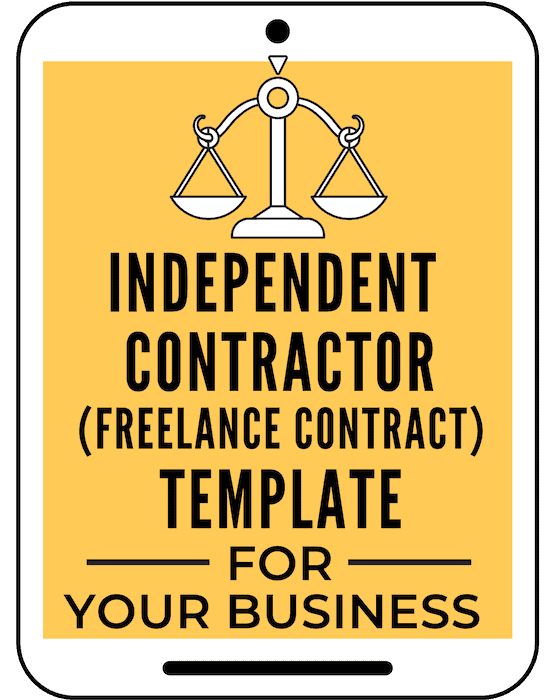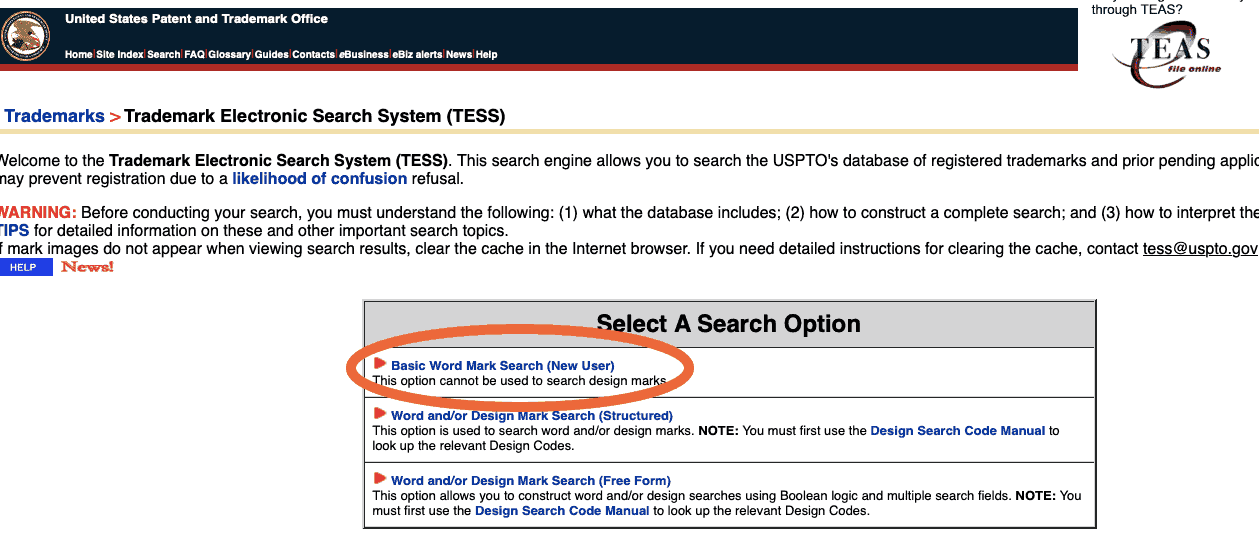How to Blog Legally: 3 Critical Policies Every Blogger Should Have
Don't let the legal side of business hold you back from starting or growing your blog. Here are the three policies one lawyer says everyone should have to blog legally and how to set them up with zero hassle.

Some of the links on DollarSprout point to products or services from partners we trust. If you choose to make a purchase through one, we may earn a commission, which supports the ongoing maintenance and improvement of our site at no additional cost to you. Learn more.
When you start a blog, there’s a lot to learn about the legal side of blogging.
Are there specific blog laws? How do I copyright website content? The list goes on and on.
It doesn’t help that blogging rules and regulations can be confusing, intimidating, and overwhelming.
Blog policies, copyrights, trademarks…they’re not things you’re expected to intimately know when first getting started.
To help bring you up to speed, we asked Amira from A Self Guru to put together a comprehensive legal guide for bloggers.
In this article, she’ll cover the 3 legal policies you must have on your blog before you launch, how to create them quickly, and how to do it all without hiring a lawyer.
3 Legal Policies Every Blog Owner Should Have
Before you start blogging and writing posts, there are 3 blog policies (also known as legal pages) you must have on your website:
- Privacy Policy
- Disclosures and Disclaimers
- Terms and Conditions
All three blog policies above serve a different purpose and are equally important to make your website legally compliant.
However, the most important purpose they serve is to protect you from lawsuits.
We’ll discuss each blog policy in detail below. Then we’ll go over how you can easily and quickly create all 3 policies through my best-selling Legal Bundle.
1. Creating a Privacy Policy for your blog
You are required by law to have a privacy policy on your blog whenever you collect personal information from your website visitors.
There are different blogging rules and regulations that require this, such as:
- EU’s General Data Protection Regulation (GDPR),
- Federal Trade Commission (FTC),
- California Online Protection Act (CalOPPA),
- Children’s Online Privacy Protection Act (COPPA),
- CAN-SPAM Act,
- among others.
A privacy policy on your blog informs your visitors about what personal information you are collecting from them and how you are going to use it.
Even if it’s just a hobby blog, you are most likely still collecting personal information and need to have a privacy policy to comply with the law.
Personal information that you may be collecting from your website visitors includes:
- Names
- Email address
- Address
- Credit Card information
- Bank details
- Phone number
- Date of Birth
- and more.
There are other ways you are collecting personal information from your website visitors, too, such as through Google Analytics, cookies, Google AdSense, etc.
As part of your Privacy Policy, you need to include key legal provisions that explain your reasons for collecting the personal information from others, how you safeguard or disclose that information, how you ensure GDPR compliance and visitor rights, and how you ensure your compliance with all the applicable blogging rules and regulations.
So if you have a blog, make sure to have a Privacy Policy template written by a lawyer that meets all of your specific legal requirements.
Privacy Policy Lawsuits
Without a privacy policy, you risk being fined and sued, like the owners of this website. They were fined $130,000 by the FTC for not complying with the legal requirements of COPPA because they allowed children under the age of 13 to register on their site without parental consent.
The FTC regularly brings lawsuits against online companies for not having a proper privacy policy that protects consumers. Take a look at Google here for example and Facebook here being sued for these reasons.
But what if my blog is small?
The FTC made it abundantly clear that no matter how big or small, all companies must follow the privacy rules and regulations to protect consumers.
Additionally, non-compliance with the GDPR results in huge fines up to 20 million Euros or 4% of the annual revenue, whichever is greater.
Remember, by not having a proper Privacy Policy on your blog, you could be legally liable for things like:
- Failure to safeguard the credit card information entered by others on your site
- Misuse of information by third parties on your site
- Intentionally or unintentionally disseminating confidential information of your users
Therefore, it’s important to meet all your legal requirements regardless of where you are located or how small your site is so that you don’t end up in legal hot water.
2. Blog Disclosures and Disclaimers
Blog disclosures are legally required just like the Privacy Policy. This is the second blog policy or legal page you must have on your blog if you publish:
- Articles with affiliate links where you earn commissions if someone purchases through your link
- Sponsored posts for which you were compensated, or
- Content for which you receive free products, discounts, or anything else in exchange.
Under the FTC, you are required to disclose your affiliate relationships, sponsorships, and any other endorsements you received to ensure transparency, honesty, and prevent misleading advertising for your readers.
For example, any time you are about to share an affiliate link for a product you recommend on your blog, you must first give your affiliate disclosure at the top of the post or right before or next to your affiliate link.
The disclosure language could be something like this –
This post may contain affiliate links. Please see full disclosure for more information [then make sure to link to your disclosure/disclaimer blog policy page here].
OR
This post contains affiliate links, and I may be compensated if you make a purchase through my link.
OR
This post may contain affiliate links. I will make a small commission if you make a purchase through one of these links, at no extra cost to you.
Any one of these is sufficient as long as it is clearly and conspicuously placed close to your affiliate link and not buried in graphics or text.
Similarly, if you were paid to write a post (i.e., a sponsored post) about a product, then you must disclose that in your blog post as well.
Here’s an example of my sponsored post I wrote for Dollar Tree where you can see what the disclosure language looks like:
You also need to use a disclosure on your social media posts for the same reasons above. You can typically do this by adding hashtags like #ad, #paid, #sponsored, #afflink, or #affiliate link.
Blog Disclaimers
Blog disclaimers are different than blog disclosures. A blog disclaimer is where you “disclaim” or “deny” legal liability for the content you publish on your blog to protect yourself from lawsuits.
Every blog needs a disclaimer because you don’t want to be legally held responsible for anything you publish on your blog.
See my legal disclaimer above as an example. It serves to limit my legal liability by putting you on notice that this content is for informational and educational purposes only.
What if the content on your blog is not up to date or is inaccurate? You don’t want anyone to rely on it and sue you later for their bad outcome.
You’d want to tailor your disclaimer to your specific blogging niche, whether it’s medical, finance, legal, or anything else.
What Could Happen Without a Disclaimer
For example, let’s say you are a health coach giving medical information on your website. I’m sure you don’t want that information to be construed as medical or health advice that someone follows, gets sick as a result, and now wants to sue you for their damages.
As another example, let’s say you’re publishing income reports on your blog but have no earnings disclaimer to protect you. Without the earnings disclaimer, you are essentially guaranteeing the same results to your visitors if they follow everything you did.
Think about how costly that could be for you if you were sued.
Needless to say, depending on what you are publishing, you need appropriate disclaimers on your blog that also include limitation of legal liability language to protect you from such lawsuits.
So even if you were sued, at least with a disclaimer, your lawyer could use it to argue and shift legal liability to the other side.
That’s why you see disclaimers on websites all the time. It’s a precautionary measure that every blogger should take before they start publishing blog posts.
Typically, both your disclosures and disclaimers are included as one legal page on your blog.
3. Blog Terms and Conditions
Blog terms and conditions are your website rules. They’re essentially a legal contract between you and your website visitors.
Terms and conditions are also referred to as terms of use or terms of service. They’re super important on your blog to cover things like:
- What is the lawful use of your blog?
- When would you terminate someone’s use of your blog?
- What are your refund or exchange policies for the products and services you offer?
- How and where you will resolve lawsuits?
- What are your intellectual property rights to prevent blog copyright infringement?
- What is the intended age of your users?
- And much more.
It may seem optional to have a terms and conditions policy on your blog. But in reality, you shouldn’t procrastinate on these. Having terms and conditions on your blog will not only prevent legal disputes in the first place, but it will also help resolve lawsuits quickly should one arise.
Without the proper terms and conditions on your blog, you don’t have much to protect you if you’re sued tomorrow.
When Terms and Conditions Come in Handy
Let’s say you live in Florida, but you end up in a legal dispute with someone in California. Where would you like to resolve this lawsuit, hire a lawyer, and attend court hearings or a trial?
Obviously, you wouldn’t want to worry about all that in California, right? Nobody likes lawsuits, but if you are faced with one, you’d want to handle all the legalities in Florida because that’s where you live.
And before we get to court in front of a judge and spend all that time and money, I’m sure you’d want to try to resolve the legal battle through an easier, less expensive, and less time-consuming process.
One of the ways you can do that is through a mediation or arbitration process. Both are alternative dispute resolution procedures. You can settle a legal dispute through the help of an impartial person instead of going to court right away and paying huge legal fees and costs.
However, you can only do this if you first have it all outlined correctly in your blog terms and conditions.
This is just one example to demonstrate why it’s so crucial to have lawyer-written terms and conditions on your blog before you launch to prevent lawsuits down the road.
Your terms and conditions legitimize your blogging business and include your Privacy Policy, Disclosures, and Disclaimers by reference.
By accepting your terms and conditions, your visitors accept all other legal pages on your blog as well.
How to Easily Create All 3 Blog Policies with My Legal Bundle
Just to recap, you need a privacy policy, disclosures/disclaimers, and terms and conditions on your blog before you launch.
It’s no surprise to me that most bloggers, beginner or advanced, get stuck on how to write these blog legal policies properly.
Unless you are a lawyer, how would you know what language you must have on your blog to fully protect yourself legally?
You could spend countless hours or days trying to research and figure out how to write these blog policies yourself. On the other hand, you could hire a lawyer to write these for you or purchase legal templates written by a lawyer.
I’ve been working as a lawyer for more than 8 years now. In my years of representing business owners like you and conducting tons of legal audits, I’ve found the free legal templates online to be missing quite a few key legal provisions that expose you to all kinds of fines and legal liabilities.
Don’t go for any free legal templates if you’re not certain they comply with all the blogging rules and regulations specific to your business and location.
Even if I wasn’t a lawyer, I still wouldn’t trust the free legal templates to protect me and my online business. The way I see it, it’s just not worth the risk of getting sued.
Paid legal templates written by a lawyer are a great way to ensure you get professionally-written blog policies at a fraction of the cost than having to hire a lawyer.
A Legal Bundle for Your Blog
My Legal Bundle includes all 3 blog policy templates we discussed above – the Privacy Policy, Disclaimer (plus your Disclosures), and Terms and Conditions + 9 additional bonuses valued at $1,175.
It is trusted by thousands of bloggers and entrepreneurs, plus thousands of my clients during the course of my legal career. But the best news is that it won’t cost you an arm and a leg.
It’s an affordable, quick, and easy solution for completing all your blog legal policies within minutes.
The Importance of Business Contracts
We just talked about how your blog’s terms and conditions are a legally enforceable contract between you and the visitors of your blog. But in order to enforce your legal rights in court, you need to make sure your contracts are in writing.
In addition to making your blog legally compliant, always remember to also use a written contract any time you work with someone in your business. As a business owner, you must get in the habit of putting your agreements in writing.
It could be with your business partner, a freelancer you hire to design your logo, a web designer to design your website, a virtual assistant to help you manage your business, or anyone else you collaborate with within your business.
Contracts are vital in your blogging business in order to:
- Prevent misunderstandings between the parties
- Avoid expensive lawsuits
- Provide you with security and peace of mind
- Prevent your confidential information from being stolen
- Ensure you get paid on time for your services
- And much more.
If you are in my Facebook group, then you may have seen my recent Facebook live where I shared my personal story of how my dad, as a business owner, got sued for $90,000 by failing to have a written contract with his freelancer. (Unfortunately, this was way before I became a lawyer. Otherwise, I’d have talked some sense into him!)
Why You Need Contracts in Your Business
To make the long story short, my dad hired a freelancer to do some work for his business. It was a “handshake deal”. There was no formal written contract because this freelancer was my dad’s so-called friend.
A few months later, my dad got served with this huge lawsuit that wiped out his entire income for the year.
The freelancer alleged that he was an employee, not an independent contractor, and was entitled to overtime pay and additional employee benefits. Without a written contract in place clarifying his independent contractor status, it was hard to argue that he was not an employee.
The lawsuit continued for almost a year. When we finally settled the case, we were short $50,000, including attorney fees and court costs.
I share this story to illustrate the point that it’s extremely important to have a contract in place. And not just any contract, but one that protects your financial and legal interests adequately.
Our family could have easily avoided this immense pain, financial loss, and months of mental anguish if my dad had used a written contract at the time.
Make Sure Your Contract Covers the Necessities
There are tons of important legal provisions that a well-written contract should cover, such as:
- Clearly defining the relationship between both parties to the contract
- Independent contractor status provision, if applicable
- Clearly defining the scope of work and services to be provided
- Effective date and term of the contract
- Clearly defining how and when the other party will be paid
- Protecting client confidentiality and intellectual property rights
- How and where the lawsuits will be resolved
- Who retains ownership of the intellectual property created by the contractor
- Indemnification clause – who covers the cost of lawsuits brought by third parties
- How to terminate the contract without penalties
- And more.
So the next time you work with someone, whether as a freelancer yourself or a client looking to hire the freelancer, always make a small investment to have a lawyer review your contract.
If you’re looking for something specific, such as an LLC operating agreement, partnership agreement, media release agreement, or anything else, then just email me, and I’ll provide you with that template.
Blogging Copyright Guidelines
The U.S. copyright law gives you legal rights to control how others can use your work. You get automatic blog copyright protection of your content from the moment you create it.
Therefore, it’s not necessary to register your work with the U.S. Copyright Office. However, it’s a good idea to do so if you want to be able to bring copyright infringement lawsuits in the future.
Copyright law protects the original work that you create in a tangible form. Some examples include:
- Blog posts
- Photos
- Manuscripts
- Books
- Song lyrics
- Paintings
- Sketches
- Poems
- Films
Copyright Infringement Lawsuits
You should never use or copy anyone’s blog legal policies, photos, designs, blog posts, or any other content without permission unless you want to be sued for copyright infringement and pay thousands of dollars.
A blogger friend of mine was recently served with a cease and desist letter because she took a photo from Google and used it on her blog. She wasn’t aware of the copyright guidelines and that innocent mistake cost her $7,000 in damages.
As a beginner blogger, don’t make that costly legal mistake. Don’t take any image from Google. There are plenty of free stock photography websites you can use instead, such as Shutterstock, Unsplash, Pixabay, Pexels, and others.
If you find that someone has copied or stolen your content, you can take legal action against the infringer.
Feel free to grab my free cease and desist letter template here to send to the infringer. This will help in getting your work removed from the infringer’s website before pursuing further legal action.
Trademarking Your Blog Name
Trademark law protects your name, logo, symbol, and other commercial signifiers used to distinguish your goods or services from others. The most important goal of trademark law is to prevent consumers from being confused in the marketplace.
Trademark law provides consumers the ability to distinguish your products or services from a competitor. In other words, I can’t have the same business name as you if we both are offering the same products and services to the same geographical market.
However, we can coexist with the same name without infringing upon another as long as our businesses are totally different. For example, the name Delta is used for both an airline and a faucet company. Similarly, Ace is both a hardware store and a brand of bandages.
In both examples, the two businesses are providing different products and services and serving different markets. Therefore, it’s less likely to confuse consumers.
A trademark can be for more than just your brand name or logo. For example, it can include:
- Words (Microsoft, Kodak, and Omega)
- Symbols (the big red K for Kellogg)
- Names (McDonald’s and Chevrolet)
- Letters (AA for American Airlines)
- Labeling (the red and white design on the Coca-Cola can)
To avoid a trademark infringement lawsuit, you shouldn’t choose a name for your blog, product, or design that’s identical or closely similar to another trademark that is already in use for a similar product or service.
Avoid Names That are Too Similar
Names don’t have to be identical for there to be an infringement. If they sound alike when spoken, are visually similar, have the same meaning, or create the same general commercial impression in the consumer’s mind, they may be considered confusingly similar.
For example, don’t come up with a name KINXS for your new band if there’s already a famous band called INXS. Although both names are pronounced differently and have different meanings, they are still similar in appearance and are likely to cause confusion. People may confuse and mistake your KINXS band with the famous INXS. This will likely get you sued by INXS for trademark infringement.
Make sure to pick a name for your blog that doesn’t violate anyone else’s rights.
How to Perform a Trademark Search
When you start your blog and pick a name, make sure to conduct a trademark search to avoid infringing upon someone else’s name and brand.
You can perform an initial trademark search on your own, but a full search should be performed by a lawyer.
Here are three ways you can perform the initial screening search for your blog name on your own:
US Patent and Trademark Office Trademark Electronic Search System (TESS): Using TESS is free. Go there, click on Basic Word Mark Search, and search for your blog name and its variations.
Remember, the names don’t have to be exact for there to be an infringement, as shown in my KINXS and INXS example above. Check for other variations of your name as well.
If you find a name in the TESS database that is very similar or identical to your proposed name and is used for an identical or closely similar product, then you should abandon that name to avoid infringement.
Conduct a Google search of your blog name: Search with and without quotation marks around your proposed name. Include any alternate spellings of that name just to be sure. If you are naming a product, search Amazon and price comparison sites for similar or identical product names.
Conduct a business directory search for your blog name, including in the state where you are located: It’s a wise idea to begin thinking about registering your trademark sooner than later if you want to protect your brand, put consumers on notice that your products, name, and logo are your property, and that you have the exclusive right to use them in regards to your products or services.
When you feel you have created value in your brand, seek a lawyer to start your federal trademark application and registration process.











